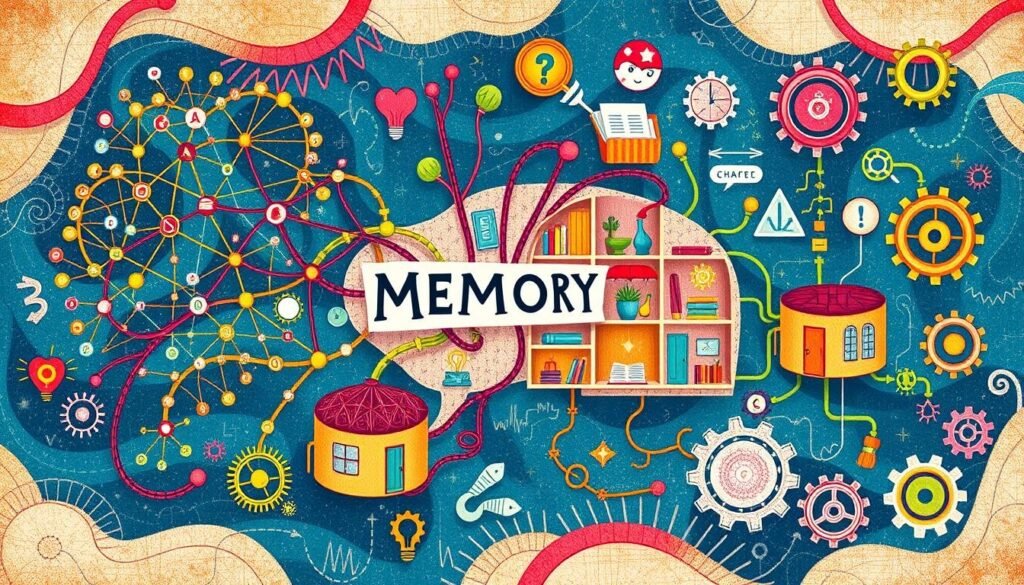In today’s fast world, students look for ways to get better grades. They often turn to old cramming methods, which can cause stress and burnout. This article offers smarter ways to study and introduces various hacks for exams.
By learning proven techniques and using the right tools, students can prepare better for exams. Knowing how to study well not only helps you remember things better. It also makes learning fun.
This article will give you tips on how to study efficiently. You’ll learn about the science of learning and how to set up a productive study space. These insights can help any student do well.
Key Takeaways
- Utilizing effective study tips can enhance academic performance.
- Exam study hacks can reduce stress during preparation.
- Choosing the best study tools for exams can streamline the learning process.
- A focused study environment plays a crucial role in effective learning.
- Understanding memory functions is vital for retention.
- Setting achievable goals helps to maintain motivation throughout study sessions.
Introduction to Effective Study Hacks
Effective study hacks can change how we learn. By using smart study strategies, students can learn and remember better. Choosing the right study techniques can boost grades and confidence in exams.
Learning is also a mental game. Methods like active recall and spaced repetition work our brains harder. They help us understand and remember things better.
Technology is key in changing how we study. Many apps help us plan, track, and learn in new ways. These tools make studying fun and less stressful.

Don’t forget the power of friends and groups. Studying with others can make learning more fun and insightful. Using tech and studying with friends can make you ready for exams.
Understanding the Science of Learning
The science of learning explores how our brains handle and keep information. Knowing this helps us find better ways to study. Techniques like mnemonic devices are key to improving memory and learning.
How Memory Works
Memory goes through stages: encoding, storing, and recalling. Short-term memory holds info briefly, while long-term memory keeps it longer. Using memory tricks like pictures and connections makes learning easier.
The Importance of Active Recall
Active recall is a top study method. It means actively pulling info from memory, not just looking at it. This strengthens brain connections and helps avoid forgetting. Research shows it boosts grades more than just reviewing.

Best Study Tools for Exams
Choosing the right study tools is key for exam prep. The best apps and tools help you remember more and work better. Here are top picks for apps and physical tools every student should have for exams.
Recommended Apps for Efficient Study
Technology has many tools to help you study better. Some top choices are:
- Quizlet – It lets you make flashcards and quizzes for active learning.
- Anki – Known for spaced repetition, it helps you remember things for a long time.
- Evernote – It’s great for organizing notes, to-do lists, and study materials all in one place.
Physical Tools that Make a Difference
Physical tools are also great for studying. They make studying more fun and effective:
- Planners – They help you plan your study schedule and track your progress.
- Highlighters – They make important points stand out in your books and notes.
- Whiteboards – Perfect for brainstorming and visual learners, they let you easily change and explain ideas.

Effective Study Tips for Better Grades
To do well in school, students need to manage their time well and stay focused. Using the right strategies can help them do better in school and keep up with their work.
Time Management Strategies
Good time management is key for students aiming to succeed. There are many ways to organize tasks and set priorities. For instance, the Pomodoro Technique helps by working in focused periods with breaks in between. Making a to-do list also helps, as it lets you tackle important tasks first.
Here are some tips for better time management:
- Create daily or weekly schedules to plan out study times.
- Set realistic deadlines to keep you on track.
- Break big tasks into smaller steps for easier handling.
- Check and change your plans as needed to fit your workload.
Staying Focused During Study Sessions
It’s important to stay focused while studying to get good grades. Distractions can really hurt your study time. Using focus techniques can help you concentrate better. Here are some ways to stay focused:
- Turn off notifications to avoid interruptions.
- Use website blockers to stay off social media during study time.
- Make a study area that’s free from distractions.
- Take short breaks to refresh your mind without losing focus.
By using these time management and focus tips, students can study more effectively. This can lead to better grades and success in school.
| Strategy | Description | Benefits |
|---|---|---|
| Pomodoro Technique | Work for 25 minutes, then take a 5-minute break. | Increases focus and prevents burnout. |
| Task Lists | Write and prioritize daily tasks. | Helps in managing workload and deadlines. |
| Dedicated Study Space | Designate a specific place for study. | Reduces distractions and improves concentration. |
Creating an Ideal Study Environment
Creating a good study environment is key to doing well in school. A tidy study area helps you stay focused and productive. By organizing your space and reducing distractions, you can learn better.
Organizing Study Spaces
A clean study area makes you feel good. Here are some tips to keep your study space organized:
- Clear out clutter to make your space welcoming.
- Make sure the lighting is right to avoid eye strain and stay alert.
- Choose a comfy chair that supports good posture and helps you concentrate.
- Have all your study materials close by to save time.
Minimizing Distractions
Reducing distractions is important for staying focused. Here are some ways to keep your study area distraction-free:
- Ask roommates or family to leave you alone during study time.
- Use noise-canceling headphones to block out outside noise.
- Put your phone and other devices in another room to avoid distractions.
- Use a specific area for studying to help you stay focused.
Having a great study environment boosts your focus, motivation, and grades. Even small changes can make a big difference in how well you learn.
Study Techniques that Maximize Retention
Learning effectively means using various techniques to keep information in your memory. Spaced repetition and chunking are key strategies. They help students remember more for exams.
Using Spaced Repetition
Spaced repetition is a method that reviews material at longer intervals. It uses the brain’s memory strength when information is repeated over time. This way, learners can remember better by spreading out study sessions.
It makes learning stick by forgetting and then relearning. This strengthens memory over time.
Chunking Information for Easier Learning
Chunking breaks down big amounts of data into smaller parts. For instance, grouping related ideas or lists. This method makes learning less overwhelming and easier to understand.
By organizing data into chunks, learners can remember related pieces better. This boosts overall retention.
Using spaced repetition and chunking together can change how students learn. Here’s a table that shows what each technique does:
| Technique | Description | Benefits |
|---|---|---|
| Spaced Repetition | Review information at spaced intervals. | Improves long-term retention and recall. |
| Chunking Information | Break down large information into smaller, related units. | Reduces cognitive load and simplifies learning. |
Exam Preparation Resources for Students
Getting ready for exams needs the right tools and resources. Students can improve their learning by using different exam prep resources. Online learning platforms and group study are great ways to succeed.
Online Courses and Webinars
Platforms like Khan Academy, Coursera, and YouTube have lots of courses and webinars. They cover many subjects, so students can find what they need. For example, Khan Academy has interactive lessons, and Coursera has courses from top universities.
Students get to learn from experts and enjoy engaging content. This makes hard subjects easier to understand.
Study Groups and Peer Learning
Studying together is a great way to learn new things and clear up doubts. By joining or starting study groups, students can share ideas and help each other. This friendly setting boosts motivation and keeps everyone on track.
Together, students can see different views on the material. This strengthens their knowledge and builds confidence before exams.
Staying Motivated Throughout Your Study Journey
Keeping up study motivation can be tough. Setting goals, especially with the SMART framework, helps a lot. SMART goals are Specific, Measurable, Achievable, Relevant, and Time-bound. They make your study tasks easier to handle.
This approach keeps you focused and lets you see your progress. You feel accomplished as you reach each goal.
Setting Achievable Goals
Smart goals help students manage their tasks better. Instead of saying “study more,” set goals like “review Chapter 3 for 30 minutes daily.” This makes your goals clear and boosts your motivation.
By setting goals regularly, you can see how far you’ve come. This helps you stay motivated and improves your overall well-being.
Rewards and Breaks for Success
It’s also key to add rewards and breaks to your study routine. Short breaks can help you stay focused and retain information better. They prevent burnout and help you balance study and life.
Receiving rewards for reaching goals, no matter how small, is a great motivator. It encourages good study habits and makes learning more fun. By doing this, students can have a productive and rewarding academic journey.
FAQ
What are some effective exam study hacks for students?
Effective study hacks include making a study schedule and using active recall. Spaced repetition and breaking down information into smaller chunks also help. These methods improve retention and exam prep.
What are the best study tools for exams?
Top study tools include apps like Quizlet and Anki. Evernote is great for note-taking. Physical tools like planners and highlighters also aid in studying.
How can students improve their study effectiveness?
Students can boost their study skills by managing time well. Use the Pomodoro Technique and stay organized. Minimize distractions and set clear goals for each study session.
What online resources are available for exam preparation?
Online, Khan Academy, Coursera, and YouTube offer many courses and webinars. Study groups also help with collaborative learning and support.
What is the importance of creating an ideal study environment?
An ideal study space is key for focus and less distraction. Organize your area, ensure good lighting, and choose quiet spots for better learning.
How does memory work in relation to studying?
Memory stores information in short-term and long-term. Mnemonic devices and active recall boost retention. Understanding the spacing effect also helps solidify knowledge.
What are some ways to stay motivated while studying?
To stay motivated, set SMART goals and reward yourself for milestones. Plan breaks and keep a healthy study-life balance to stay motivated.
